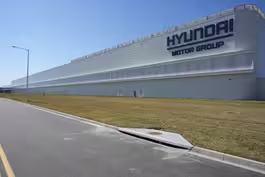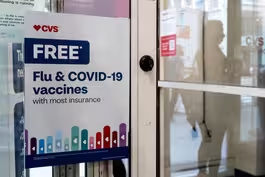
Federal agency that probes chemical disasters faces shutdown
Clip: 9/6/2025 | 6m 44sVideo has Closed Captions
Only federal agency that investigates chemical disasters faces shutdown under Trump
The U.S. Chemical Safety Hazard and Investigation Board, or CSB, investigates root causes of serious chemical accidents and makes recommendations for preventing similar events. The Trump administration wants to shut the small federal agency down, saying it duplicates the role of other agencies like the EPA and OSHA. Ali Rogin speaks with David Michaels, a former OSHA director, for more.
Problems playing video? | Closed Captioning Feedback
Problems playing video? | Closed Captioning Feedback
Major corporate funding for the PBS News Hour is provided by BDO, BNSF, Consumer Cellular, American Cruise Lines, and Raymond James. Funding for the PBS NewsHour Weekend is provided by...

Federal agency that probes chemical disasters faces shutdown
Clip: 9/6/2025 | 6m 44sVideo has Closed Captions
The U.S. Chemical Safety Hazard and Investigation Board, or CSB, investigates root causes of serious chemical accidents and makes recommendations for preventing similar events. The Trump administration wants to shut the small federal agency down, saying it duplicates the role of other agencies like the EPA and OSHA. Ali Rogin speaks with David Michaels, a former OSHA director, for more.
Problems playing video? | Closed Captioning Feedback
How to Watch PBS News Hour
PBS News Hour is available to stream on pbs.org and the free PBS App, available on iPhone, Apple TV, Android TV, Android smartphones, Amazon Fire TV, Amazon Fire Tablet, Roku, Samsung Smart TV, and Vizio.
Providing Support for PBS.org
Learn Moreabout PBS online sponsorshipJOHN YANG: The U.S. chemical Safety Hazard and Investigation Board, or CSB, is a small federal agency with a big name and a singular mission, investigating the root causes of serious chemical accidents and making recommendations for preventing similar events in the future.
The board also produces award winning animated reenactment videos which serve as instructive after action reports.
They've got a devoted following online.
MAN: The dryer catastrophically exploded.
At 11:05 a.m. there was a large explosion.
The tank separated from its base and launched up and over a six story structure.
JOHN YANG: But the Trump administration wants to shut the agency down.
It says the CSB duplicates the role of other agencies like EPA and OSHA, the Occupational Safety and Health Administration.
Ali Rogin spoke with former OSHA Director Dave Michaels, who's now a George Washington University professor.
ALI ROGIN: David, thank you for joining us.
What does the U.S. Chemical Safety Board do?
DAVID MICHAELS, Former Director, OSHA: The Chemical Safety Board comes into businesses after there's been a catastrophe, a major explosion via a chemical release in situations where workers, neighbors or first responders are killed, and it does a root cause investigation.
The Chemical Safety Board has no enforcement responsibilities.
It can't issue fines.
No one goes to jail because of its findings.
It really tries to get down into depth and what happened?
Why did this occur?
And how can we make sure it never happens again?
ALI ROGIN: The Trump administration says it wants to eliminate the Board because it's redundant.
You've argued that it is a really unique entity.
Why do you say that?
DAVID MICHAELS: That's right.
OSHA and EPA by law don't do these sort of root cause analyses.
When I ran OSHA, I would send in an inspector.
Inspector says, are you meeting OSHA regulations?
And if not, we issue a fine.
But the issues that the CSP looks at are much deeper.
They're broader.
They're much more difficult to address than OSHA or EPA.
And if they were eliminated, we would all suffer.
Certainly companies that use chemicals recognize that they need the CSB to understand how they can make their workplaces safer.
ALI ROGIN: For the average American, why should it matter to them that the Chemical Safety Board not go away?
DAVID MICHAELS: There have been so many Americanists to this point who have been affected by these catastrophes that the CSB investigates and anyone who lives anywhere near a facility that uses chemicals is at risk.
The Chemical Safety Board's findings and their videos are very powerful teaching tools to businesses, to first responders, even to agencies like EPA and OSHA, how to work better, how to make sure no one's going to get hurt in the future.
ALI ROGIN: We talked about those videos.
They've developed a real cult following among folks online and of course they're instructive for people in the industry itself.
Tell me about the unique function that those videos play.
DAVID MICHAELS: One of the great things the CSB does is once they do their investigation, they really dig down as to what was the problem with the process safety system or as occurred at a huge event which killed 15 workers at a BPV refinery in Texas City.
They found that workers had worked weeks in a row every day, sometimes 12 hour days, and people were tired.
So they turn these findings into videos.
And so they're not just reports that sit on a shelf.
You can watch these incredibly well made videos with animation and interviews with the managers, with the workers.
And so the lessons are really conveyed much more effectively than other agencies can do that.
ALI ROGIN: What does industry say about the presence of the board?
DAVID MICHAELS: Well, part of the chemical industry most affected by this, the company is represented by the American Chemistry Council.
The industry trade association said that the CSB's investigations, their reports and their videos have been a very valuable resource and they don't want to see it go away.
No one is asking for the CSB to be closed except for Elon Musk and the DOGE people and now the White House.
ALI ROGIN: And of course, this is happening in the context of President Trump seeking to bring manufacturing back from overseas to the United States.
Does that to you underscore the importance of having this independent board?
DAVID MICHAELS: We want to bring as many jobs as we can back to the United States, but we want to bring back safe jobs.
If we bring back factories that explode or that emit large numbers of chemicals, it's a self-defeating process.
We need to bring back safe jobs.
And if we're bringing back these jobs, the CSB can play a really useful role in.
ALI ROGIN: So why then do you think President Trump is looking to shutter this board?
DAVID MICHAELS: I think within the White House right now, there is this visceral dislike of the government.
Every industry I have any contract with, every union I have any contract with, first responder organizations, they all see the need for the CSB because they've seen the animations, they've read the reports.
They know that CSB reports and videos have prevented catastrophes that have cost many, many times the tiny budget of the CSB.
ALI ROGIN: Now, if we go back in recent history, President George H.W.
Bush, President Clinton both argued against the formation of this board.
Why was that at the time and how do you think the board has evolved since then?
DAVID MICHAELS: When Congress first passed legislation forming the Chemical Safety Board, I think the chemical industry, the petroleum industry, they were very worried and they pressured the White House not to start the board from going.
In the 30 or more year since then, the Chemical Safety Board has proved its worth many times over.
And all those industries that were opposed to the board when it got started now are quite supportive of it.
But we need that outside oversight.
And the CSB is a small agency.
It's a $14 million budget and they punch way above their weight.
ALI ROGIN: David Michaels, former OSHA head, now a professor at G.W.
University, thank you so much for joining us.
DAVID MICHAELS: My pleasure.
Great to be here with you.
Khruangbin rises at the forefront of a new music movement
Video has Closed Captions
Clip: 9/6/2025 | 7m 14s | Meet Khruangbin, the Texas trio at the forefront of a new music movement (7m 14s)
News Wrap: South Korea expresses concern over DHS raid
Video has Closed Captions
Clip: 9/6/2025 | 2m 54s | News Wrap: South Korea expresses concern over immigration raid at Hyundai plant (2m 54s)
States join forces to make their own vaccine recommendations
Video has Closed Captions
Clip: 9/6/2025 | 6m 37s | States join forces to make their own vaccine recommendations amid CDC turmoil (6m 37s)
Providing Support for PBS.org
Learn Moreabout PBS online sponsorship
- News and Public Affairs

FRONTLINE is investigative journalism that questions, explains and changes our world.

- News and Public Affairs

Amanpour and Company features conversations with leaders and decision makers.












Support for PBS provided by:
Major corporate funding for the PBS News Hour is provided by BDO, BNSF, Consumer Cellular, American Cruise Lines, and Raymond James. Funding for the PBS NewsHour Weekend is provided by...


